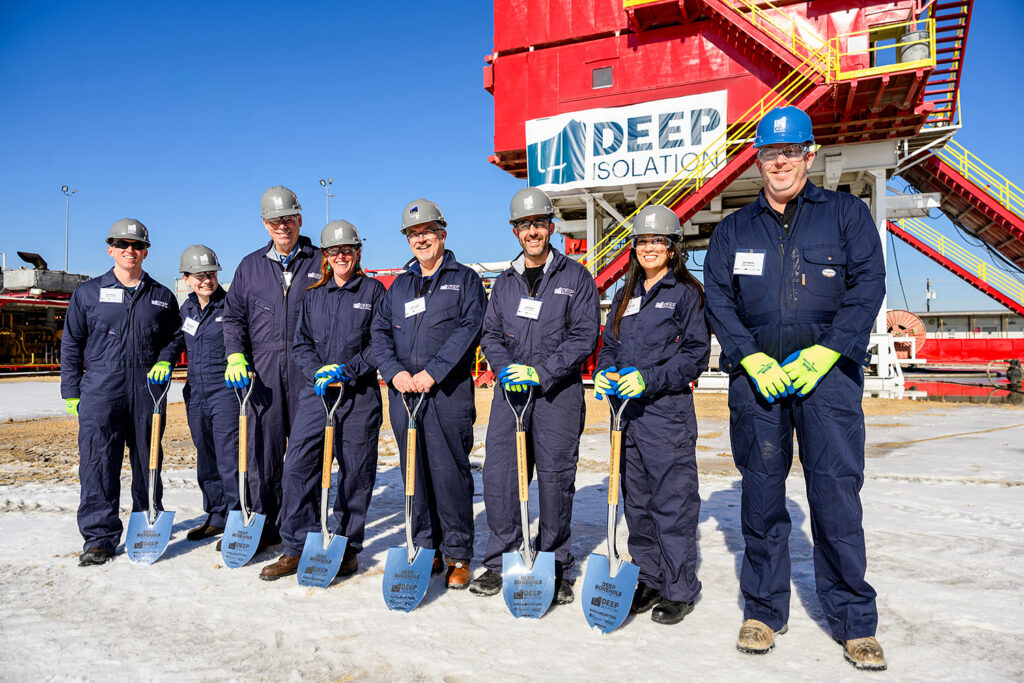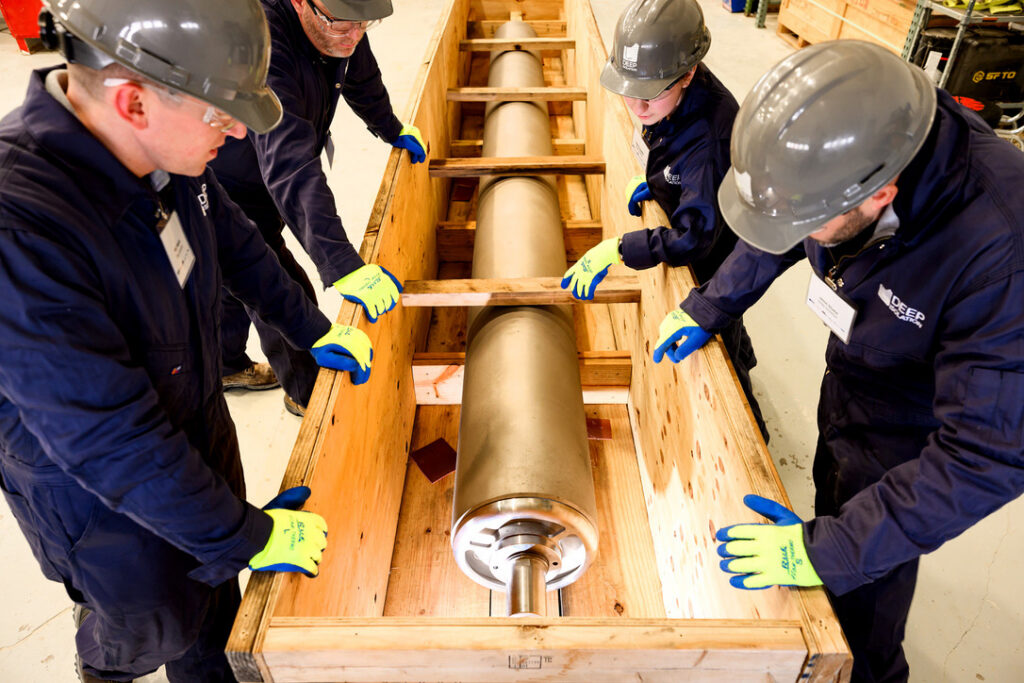Whitten-Doolin brings extensive experience in corporate governance, strategic transactions, and regulatory compliance to the role, as Deep Isolation advances its innovative nuclear waste disposal technology
Deep Isolation Nuclear, Inc. (“Deep Isolation” or the “Company”), a leading innovator in nuclear waste disposal technology, today announced the appointment of Paula Whitten-Doolin as the Company’s General Counsel, effective immediately.
Ms. Whitten-Doolin brings more than 15 years of experience in corporate and legal affairs to Deep Isolation, with deep expertise in the energy sector and advising publicly traded companies. Most recently, she served as General Counsel, Chief Administrative Officer and Chief Compliance Officer for Houston First Corporation, where she managed corporate governance, negotiated multimillion-dollar land deals, and provided strategic advice on multibillion-dollar real estate projects. Prior to that role, she served as General Counsel and Chief Compliance Officer for Ideanomics, a multinational publicly-traded electric vehicle and renewables corporation. Previously, Whitten-Doolin served as Head of Legal Operations and Chief Legal Counsel, North America for Neste, where she built and supervised a six-person legal department for its $4B+ North American renewable energy business. She also held senior legal roles at Schlumberger and MI SWACO, Cooper Industries/Eaton. Whitten-Doolin currently serves as an Independent Board Member for Vuzix Corporation (NASDAQ: VUZI) and holds a J.D. from Northwestern University School of Law and a B.S. from the California Institute of Technology (Caltech).
“Paula’s extensive experience in corporate governance, strategic transactions, and SEC compliance will be invaluable as Deep Isolation continues to advance our mission of providing safe, practical solutions for nuclear waste disposal,” said Rod Baltzer, Deep Isolation’s President and CEO. “Her proven track record of leadership in complex, highly regulated industries and with publicly traded companies positions her perfectly to guide the company through our next phase of growth and commercial development.”
“Deep Isolation is addressing one of the most critical challenges facing the nuclear energy industry with innovative, scientifically rigorous solutions,” said Whitten-Doolin. “The company’s recent project successes demonstrate the technical viability and safety of their deep borehole disposal technology. I’m excited to join the team at this pivotal moment as Deep Isolation advances toward full-scale demonstration and works to bring transformative solutions to market.”
Whitten-Doolin’s appointment reflects Deep Isolation’s continued expansion of its leadership team as the Company advances toward commercialization of its deep borehole disposal technology. The appointment follows the recent addition of Ralph L. Hunter to Deep Isolation’s Board of Directors, demonstrating the Company’s commitment to attracting experienced leaders with proven track records in complex, regulated industries. Together, these strategic additions strengthen Deep Isolation’s organizational capabilities and position the Company to execute on its mission of providing safe, practical solutions for nuclear waste disposal as it works toward full-scale demonstration and commercial deployment of its innovative technology.
About Deep Isolation
Deep Isolation is the first company to undertake development of technologies for nuclear waste disposal in deep boreholes. Deep Isolation has commenced a planned three-year initiative to complete a full-scale, at-depth demonstration of its Universal Canister System and deep borehole solution, a critical milestone to the company’s commercialization strategy. When commercialized, Deep Isolation’s solution will offer a uniquely tailored solution to help countries identify, plan for and complete the necessary steps to dispose of their nuclear waste inventories. With 91 patents issued to date, Deep Isolation’s technology is being designed to leverage proven drilling practices to allow safe isolation of waste deep underground in horizontal, vertical, or slanted borehole repositories. Deep Isolation’s Universal Canister System was developed through a three-year project funded by the U.S. Department of Energy’s Advanced Research Projects Agency—Energy and is engineered to support integrated management of spent fuel and high-level waste from advanced reactors across storage, transportation and eventual disposal.
###
For more information, visit: deepisolation.com
Media Contact:
Sophie McCallum
media@deepisolation.com
Investor Contact:
Caldwell Bailey
InvestorRelations@deepisolation.com
Forward-Looking Statements
Statements contained in this news release that are not historical facts are “forward-looking information” or “forward-looking statements” (collectively, “forward-looking statements”) within the meaning of Section 27A of the Securities Act and Section 21E of the Securities Exchange Act of 1934, as amended. Forward-looking statements include, but are not limited to, statements regarding our plans, objectives and expectations for our business, the future growth of our business and the nuclear energy and nuclear waste disposal industries as a whole, and future benefits expected to arise from our strategic partnerships. In certain cases, forward-looking statements can be identified by the use of words and phrases or variations of words and phrases or statements such as “may,” “should,” “expect,” “intend,” “plan,” “anticipate,” “believe,” “estimate,” “predict,” “will,” “could,” “project,” “target,” “potential,” “continue” and similar expressions. Forward-looking statements are based on management’s belief and assumptions, including current expectations and projections about future events and trends, and on information currently available to management.
Forward-looking statements in this or any other news release are subject to a number of risks, uncertainties, and assumptions that could cause actual results to be materially different from those expressed or implied by such forward-looking statements. Such risks, uncertainties, and assumptions are subject to a number of factors, including, among others: the failure of a market to develop for our deep borehole disposal solutions as quickly as we expect or at all; a failure of demand for our solution to develop sufficiently; regulatory and legal developments, including issues relating to obtaining regulatory approvals or permissions on the timelines we expect or at all; our lack of profitability; delays or failure in our initiative to complete a full-scale, at-depth demonstration of our Universal Canister System and our deep borehole solution; our failure to enter into contracts with customers or, once we do enter into contracts, to continue such contractual relationships or to receive new contract awards; our dependency on governmental contracts and awards; our failure to manage our growth effectively or to execute our business plan; a failure to sustain and expand relationships with governmental entities and strategic partners; failure in the assumptions or analyses we have used in supporting forecasts or plans; our inability to commercialize our products at scale; the development or deployment of other technologies or solutions supplanting or competing with our technologies; challenges to our intellectual property; failures to protect, maintain, enforce, and enhance our intellectual property, and claims by others of intellectual property infringement; political and public perceptions of nuclear energy, including perceptions as to accidents or other high-profile events involving nuclear power facilities or radioactive materials; our liquidity and ability to raise capital; any inability to control operating and project costs and project delays or other project-related problems; security (including cybersecurity) breaches or disruptions; geopolitical, macroeconomic, domestic events or crises, including supply chain disruptions and other risks and uncertainties outside of our control; weather and effects of climate change; and litigation or legal proceedings that may be brought against us.
The foregoing is not an exhaustive list of all the factors that may cause any forward-looking statements to prove inaccurate or our actual results to differ materially from our expectations and forecasts. Moreover, we operate in a highly regulated environment. New risks emerge from time to time. It is not possible for our management to predict all risks, nor can we assess the impact of all factors on our business or the extent to which any factor, or combination of factors, may cause actual results to differ materially from those contained in any forward-looking statements we may make. In light of these risks, uncertainties, and assumptions, the future events and trends discussed in this release may not occur and actual results could differ materially and adversely from those anticipated or implied in the forward-looking statements, and we cannot guarantee future results, performance, or achievements. Accordingly, readers should not place undue reliance on forward-looking statements. We undertake no obligation to update any forward-looking statements for any reason after the date of this release or to conform these statements to actual results or revised expectations, except as required by law.
Additional information concerning the factors above and other factors will be found in the Company’s public filings with the Securities and Exchange Commission (the “SEC”), including the sections titled “Forward-Looking Statements” and “Risk Factors” in the Company’s Quarterly Report on Form 10-Q for the quarter ended September 30, 2025 filed with the SEC on November 14, 2025 and in filings with the SEC that will be made. The Company’s SEC filings are available free of charge at www.sec.gov filed or upon written request to Deep Isolation Nuclear at InvestorRelations@deepisolation.com.
###



